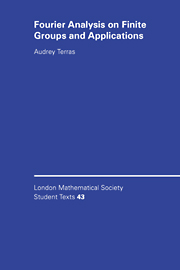Book contents
- Frontmatter
- Contents
- Preface
- Part I Finite Abelian Groups
- Part II Finite Nonabelian Groups
- 15 Fourier Transform and Representations of Finite Groups
- 16 Induced Representations
- 17 The Finite ax + b Group
- 18 The Heisenberg Group
- 19 Finite Symmetric Spaces–Finite Upper Half Plane Hq
- 20 Special Functions on Hq – K-Bessel and Spherical
- 21 The General Linear Group (Expression not displayed)
- 22 Selberg's Trace Formula and Isospectral Non-isomorphic Graphs
- 23 The Trace Formula on Finite Upper Half Planes
- 24 Trace Formula For a Tree and Ihara's Zeta Function
- References
- Index
16 - Induced Representations
from Part II - Finite Nonabelian Groups
Published online by Cambridge University Press: 06 July 2010
- Frontmatter
- Contents
- Preface
- Part I Finite Abelian Groups
- Part II Finite Nonabelian Groups
- 15 Fourier Transform and Representations of Finite Groups
- 16 Induced Representations
- 17 The Finite ax + b Group
- 18 The Heisenberg Group
- 19 Finite Symmetric Spaces–Finite Upper Half Plane Hq
- 20 Special Functions on Hq – K-Bessel and Spherical
- 21 The General Linear Group (Expression not displayed)
- 22 Selberg's Trace Formula and Isospectral Non-isomorphic Graphs
- 23 The Trace Formula on Finite Upper Half Planes
- 24 Trace Formula For a Tree and Ihara's Zeta Function
- References
- Index
Summary
One of the highlights among the [Frobenius] papers published after 1896 was a deep analysis of the relation between characters of a group G and the characters of a subgroup H of G.… As he stated in the introduction, an understanding of this relationship is crucial for the practical computation of representations and characters – a statement as true now as it was then!
C. Curtis [1992, p. 51]This chapter gives a way of constructing representations of finite groups from those of subgroups called the method of induced representations. In 1898 Frobenius invented the method of induction by writing down the formula for the character of the induced representation of a finite group. In 1927 Speiser gave formulas for the matrix entries. Wigner obtained induced representations of the (infinite) Lorentz group from the subgroup of translations in 1939. In 1940 Weil showed how to do induction for compact groups. In the 1950s Mackey [1976], [1978a,b] developed the theory for noncompact, locally compact groups. Around the same time Selberg invented his trace formula and applied it to the group G = SL(2, ℝ) and various discrete subgroups acting on G/K, K = SO(2). See Terras [1985, Vol. I]. We will see in Chapter 22 that the finite analogue of Selberg's trace formula will allow us to prove some of the results such as the Frobenius reciprocity law in an elegant way (see Chapter 22 and Arthur [1989]).
Information
- Type
- Chapter
- Information
- Fourier Analysis on Finite Groups and Applications , pp. 267 - 280Publisher: Cambridge University PressPrint publication year: 1999
